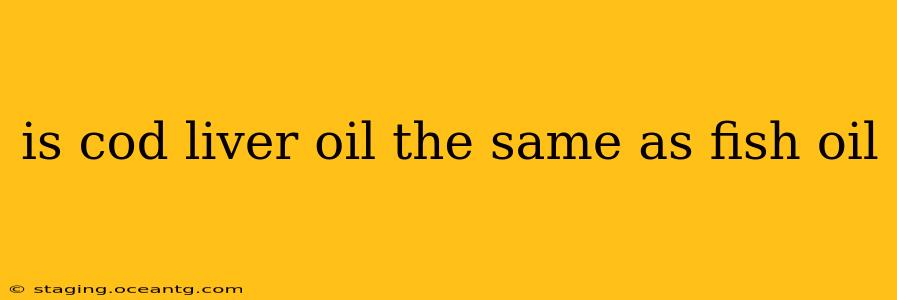Is Cod Liver Oil the Same as Fish Oil? Understanding the Differences
While both cod liver oil and fish oil are derived from fish and offer similar health benefits, they are not exactly the same. Understanding their key distinctions is crucial for making informed choices about your supplement regimen. This article will delve into the specifics, answering common questions and clarifying the nuances between these popular health supplements.
What is Cod Liver Oil?
Cod liver oil is extracted from the liver of cod fish. This distinguishes it from other fish oils, as it's a specific type of fish oil. Because it comes from the liver, cod liver oil is naturally rich in vitamins A and D in addition to omega-3 fatty acids (EPA and DHA). These vitamins are fat-soluble, meaning they are stored in the body's fat tissues. Therefore, cod liver oil provides a more concentrated source of these vitamins compared to other fish oil supplements.
What is Fish Oil?
Fish oil is a broader term encompassing oils extracted from various fatty fish, such as salmon, mackerel, anchovies, and sardines. While it also contains omega-3 fatty acids (EPA and DHA), it typically has lower levels of vitamins A and D than cod liver oil. Fish oil supplements often focus primarily on the omega-3 fatty acid content, with varying concentrations of EPA and DHA depending on the source and manufacturing process.
What are the Key Differences?
The primary difference lies in the source and nutrient profile. Cod liver oil is specifically from cod livers, offering a concentrated source of vitamins A and D alongside omega-3s. Fish oil, on the other hand, is a broader category, with varying vitamin and omega-3 content depending on the fish species used.
Another key difference is the potential for vitamin A toxicity. Because cod liver oil is rich in vitamin A, consuming excessive amounts can lead to hypervitaminosis A, a condition with potential adverse effects. Fish oil supplements typically have much lower vitamin A content, reducing this risk.
Is it better to take cod liver oil or fish oil?
The "better" choice depends on individual needs and health goals. If you're looking for a concentrated source of vitamins A and D alongside omega-3s, cod liver oil may be a suitable option. However, it's essential to follow recommended dosages carefully to avoid vitamin A toxicity. If your primary goal is omega-3 fatty acid supplementation, and you are already consuming sufficient amounts of vitamins A and D through diet or other supplements, regular fish oil might be a preferable choice.
What are the benefits of cod liver oil?
Cod liver oil offers potential benefits related to:
- Immune system support: Vitamins A and D play crucial roles in immune function.
- Bone health: Vitamin D is essential for calcium absorption and bone strength.
- Vision health: Vitamin A contributes to maintaining healthy vision.
- Heart health: Omega-3 fatty acids may support heart health.
- Brain health: Omega-3s are vital for brain function.
What are the benefits of fish oil?
Fish oil supplements provide primarily omega-3 fatty acid benefits, focusing on:
- Heart health: Reducing triglycerides and blood pressure.
- Brain health: Supporting cognitive function and reducing the risk of dementia.
- Mental health: Potentially improving mood and reducing symptoms of depression.
- Inflammation reduction: Omega-3s have anti-inflammatory properties.
Can I take cod liver oil and fish oil together?
While you can technically take both, it's generally not recommended without consulting a doctor or healthcare professional. Consuming both could lead to an excessive intake of vitamins A and D, increasing the risk of adverse effects. It's crucial to carefully monitor your intake of these fat-soluble vitamins to ensure you remain within safe limits.
Are there any side effects?
Both cod liver oil and fish oil can cause side effects in some individuals, including:
- Fishy burps or aftertaste: This is a common side effect.
- Stomach upset: Including nausea, diarrhea, or heartburn.
- Vitamin A toxicity (cod liver oil): Excessive intake can lead to various health problems.
In conclusion, while both cod liver oil and fish oil offer valuable health benefits, they are not interchangeable. The best choice depends on your individual needs and health status. Always consult with a healthcare provider before starting any new supplement regimen, especially if you have pre-existing health conditions or are taking other medications. They can help you determine the appropriate dosage and type of supplement based on your unique requirements.
